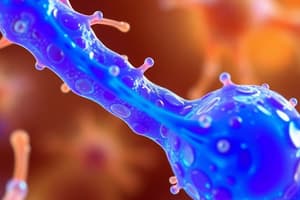Podcast
Questions and Answers
What is the primary focus of OCR Biology?
What is the primary focus of OCR Biology?
- Studying historical biological discoveries
- Developing experimental skills and data analysis (correct)
- Memorization of facts and figures
- Learning to classify living organisms
Which molecule is NOT considered a biological macromolecule?
Which molecule is NOT considered a biological macromolecule?
- Carbohydrates
- Water (correct)
- Proteins
- Nucleic acids
Which of the following best describes Mendelian inheritance?
Which of the following best describes Mendelian inheritance?
- Inheritance of traits influenced by numerous genes
- Inheritance based solely on environmental factors
- Simple patterns of inheritance governed by single genes (correct)
- Inheritance of traits from multiple sources
Which aspect of ecosystems is primarily affected by human activity?
Which aspect of ecosystems is primarily affected by human activity?
What is a key component of effective experimental design in biology?
What is a key component of effective experimental design in biology?
Which of the following is NOT a function of the immune system?
Which of the following is NOT a function of the immune system?
What is included in the study of biological molecules?
What is included in the study of biological molecules?
What learning strategy can be particularly effective for mastering complex biological concepts?
What learning strategy can be particularly effective for mastering complex biological concepts?
Flashcards
Cellular Respiration
Cellular Respiration
The process by which cells break down glucose to release energy in the form of ATP.
Photosynthesis
Photosynthesis
The process by which plants use sunlight, water, and carbon dioxide to create glucose and oxygen.
Genetics
Genetics
The study of how genes are passed from parents to offspring.
Evolution
Evolution
Signup and view all the flashcards
Biodiversity
Biodiversity
Signup and view all the flashcards
Ecosystem
Ecosystem
Signup and view all the flashcards
Immune System
Immune System
Signup and view all the flashcards
Health Science
Health Science
Signup and view all the flashcards
Study Notes
Introduction to OCR Biology
- OCR (Oxford Cambridge and RSA) Biology is a challenging and comprehensive subject requiring deep understanding of biological principles.
- The course focuses on developing experimental skills, data analysis, and critical thinking, alongside theoretical knowledge.
- It covers a broad range of topics spanning from cellular processes to ecosystems, and includes practical investigations.
- Students will gain an understanding of modern biological techniques, and develop an appreciation of the significance and impact of biology in society.
Key Areas of Study
- Biological Molecules:
- Carbohydrates, lipids, proteins, and nucleic acids.
- Structure, function, and properties of each molecule.
- Importance in biological systems.
- Cells:
- Structure and function of eukaryotic and prokaryotic cells.
- Cell membranes and transport mechanisms (active and passive).
- Cellular respiration and photosynthesis.
- Genetics:
- DNA structure and replication.
- Gene expression and protein synthesis.
- Mendelian inheritance and genetic variations.
- Genetic engineering.
- Evolution and Biodiversity:
- Natural selection and adaptation.
- Classification and evolutionary relationships.
- Biodiversity and its conservation.
- Ecosystems:
- Communities, populations, and ecosystems.
- Nutrient cycles and energy flows.
- Biomes and their characteristics.
- Human impact on ecosystems.
- Experimental Design and Practical Skills:
- Planning and carrying out experiments.
- Data collection, analysis, and evaluation.
- Use of appropriate scientific language.
- Drawing accurate diagrams of biological specimens.
- Maintaining Health:
- The immune system and its response to pathogens.
- Diseases and disorders.
- Maintaining healthy lifestyles.
- Impact of lifestyle choices.
Assessment Methods
- Exam and coursework components.
- Practical examinations.
- Written papers focusing on theoretical knowledge.
- Assessment of experimental design, data handling and analysis skills.
- Potential for extended essays.
Learning Strategies
- Active recall and repetition.
- Understanding underlying concepts rather than rote learning.
- Developing well-organized notes to aid memorization.
- Using past papers to identify areas needing further study.
- Attending lessons and asking questions.
- Collaboration with classmates.
- Using visual aids and diagrams to understand complex concepts.
Studying That Suits You
Use AI to generate personalized quizzes and flashcards to suit your learning preferences.




